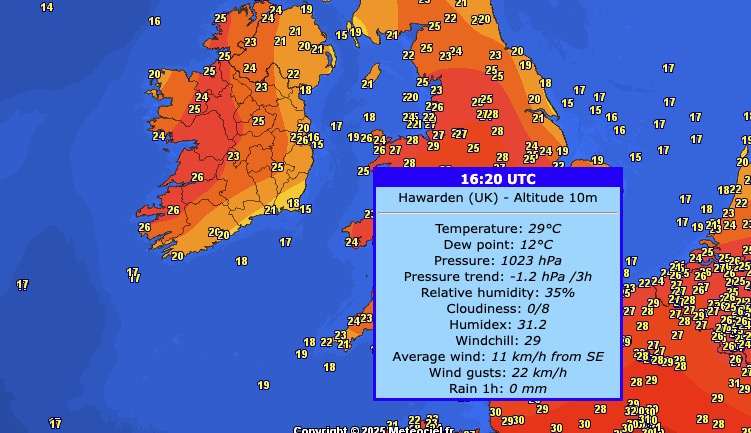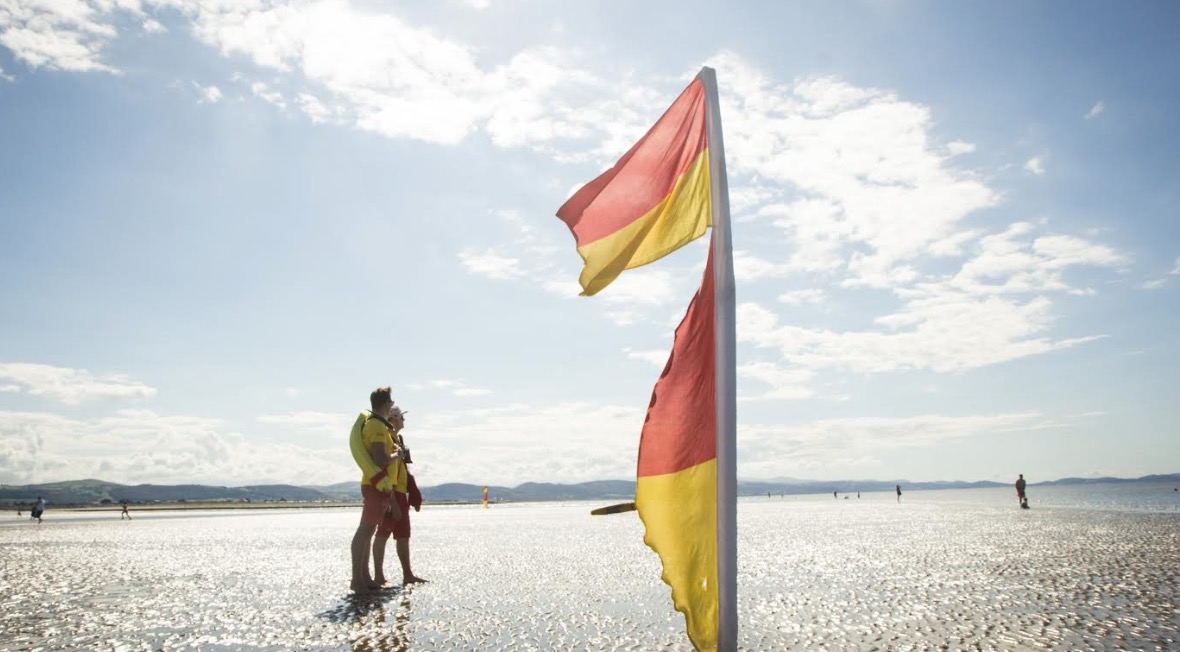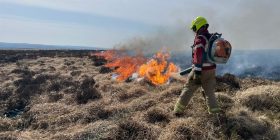Hawarden records near 30°C with hot spell set to continue

Temperatures peaked at 29°C in Deeside on Thursday, according to official Met Office data from Hawarden Airport, as much of the UK experienced the first significant heatwave of the summer.
The warmest part of the day locally came between 4.30 pm and 5.00 pm, with readings showing 29°C and humidity levels below 40%. Earlier in the afternoon, temperatures gradually climbed from 17°C at 8.00 am, crossing the 25°C mark just before midday.
The rise comes amid a spell of settled weather due to high pressure over the UK. Although the UK Health Security Agency (UKHSA) has issued an Amber Heat Health Alert for England, the alert does not apply to Wales.
Nationally, the Met Office is forecasting highs of up to 34°C in eastern parts of England by Saturday. In Wales, temperatures could reach 28°C, with increased humidity in the north and west making conditions feel more uncomfortable.
Deputy Chief Meteorologist Dan Holley said: “While Saturday will be a dry and fine day for many, a few showers or thunderstorms will be possible across northern and western parts of the UK, with an increasing risk of some intense thunderstorms developing across portions of north Wales, northern England and southern Scotland later in the afternoon and into the evening hours.”
Some areas could experience what forecasters term a “tropical night”, where temperatures do not fall below 20°C, making sleep difficult.

RNLI issues safety warning as temperatures rise
With warmer weather drawing more people to the coast, the Royal National Lifeboat Institution (RNLI) is urging the public to take extra care around water.
Chris Cousens, RNLI Water Safety Lead, said:
“Heading to the coast in hot weather is a great way to have fun, relax and cool off – but the water can be dangerous. Air temperatures may feel warm, especially over the next few days, but UK sea temperatures are cold enough year-round to trigger cold-water shock, while big waves and strong rip currents can over-power even the most confident water users.
“The single piece of advice we’re urging people to remember is Float to Live: Tilt your head back, with your ears submerged. Relax and try to breathe normally. Move your hands and legs to help you stay afloat if you need to. It’s fine if your legs sink – we all float differently.
“By doing this, you give yourself the chance to rest and recover your breathing. Once you’ve regained control of your breathing, you can call for help or swim to safety.
“We know this advice saves lives. To date, we’re aware of around 50 people who have used the Float to Live advice to help themselves survive when in danger in the water – and these are just the cases we’re aware of.”
The RNLI says the risk of accidental drowning is five times higher when air temperatures are above 25°C – conditions expected across much of Wales in the coming days.
“Many students will also be finishing their GCSE exams and looking to celebrate the start of summer. We want everyone to enjoy the coast safely and know what to do if they or someone else gets into difficulty,” Chris Cousens added.
The RNLI’s water safety advice includes:
Float to Live: Tilt your head back with ears submerged, relax and breathe normally. Move hands and feet to stay afloat. It’s fine if your legs sink.
If you see someone else struggling: Call 999 or 112 and ask for the Coastguard. Encourage them to float and throw something buoyant if possible.
Lifeguarded beaches in Wales can be found at: rnli.org/find-my-nearest/lifeguarded-beaches
More advice at: RNLI.org/Float
High pollen and UV levels are also expected across the country, posing further health risks, especially to those with hay fever or skin sensitivity.
The British Veterinary Association is also reminding pet owners to ensure animals have shade, fresh water, and are not walked in the heat of the day.
Looking ahead, temperatures are expected to ease from Sunday onwards as fresher air moves in from the Atlantic.
Spotted something? Got a story? Send a Facebook Message | A direct message on Twitter | Email: [email protected]Latest News









